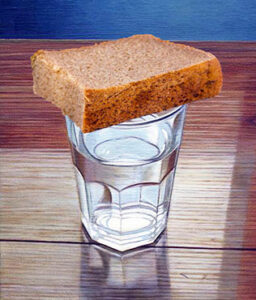Why can't I lose weight?
The days become longer, the nights shorter: that means the spring – to BE. And now is the best time to put up a fight and get rid of those extra pounds for good!
Why can’t I lose weight?
There are only two real reasons:
- You are consuming more calories than your body needs – There is NO calorie deficit in your daily diet.
Or.
- You only think you are in a calorie deficit, but in fact, you are still regularly consuming too many calories.
I don’t want to offend anyone with my disbelief, but the fact remains – we all live in a physical world and are subject to the laws of physics.
I often hear: “I have tried 100 times, I have counted, I have been eating only 900kcal for a year, but the weight is not changing …”.
You know, I have some unpleasant news for you – if you are not losing weight when you are in a calorie deficit, you are NOT in a calorie deficit. PERIOD.
Drop all resentment and disbelief, and just take a look at your menu.⠀
No one has to live their whole life counting calories.
However.
If you TRULY want to get rid of weight for good, be healthy and feel good – you do need to learn to at least count what you eat and understand what it will or will not do for your body.
There is no other way. There just isn’t. And there won’t be.
Be honest. Not to me, or anyone else – to yourself. Count everything you put in your mouth. At least for a couple of months. Every last morsel – to find out how many calories are in a slice of bread or an innocent piece of dark chocolate.
Either you get serious about losing weight, or you make people laugh at your inability to lose excess weight with the excuse of incredible genetics and heredity …
12 main reasons why you’re losing less weight than you expected
If you’re trying to lose weight, you’re likely to lose quite a lot at first – and even without much effort.
However, after a while, the weight loss may slow down or stop altogether.
Here are the 12 most common reasons why you are unable to lose weight:
1 Your body composition changes
If you think you’re at a weight loss plateau, you shouldn’t start worrying right away.
The situation where the weight stays the same (or even increases slightly) for several days or weeks is quite common.
Weight loss plateaus can be explained by muscle gain, undigested food and body water fluctuations…
In other words, if your weight does not change, you may still lose fat while your muscle mass increases.
If you have recently started exercising – your weight may even be increasing, as the increase in physical activity can cause temporary inflammation and damage to muscle fibres. To promote muscle repair and recovery, the body responds by retaining fluid, which results in temporary weight gain.
Instead of relying solely on weight, measure your waist circumference once a month and, if possible, your body fat.
Read more about body recomposition and how to measure your progress HERE.
2 You eat too much
If you have difficulty losing weight, you may be eating too much (taking in too many calories). This can happen for several reasons:
You don’t watch what you eat
Research shows that keeping track of your food intake helps with weight loss.
Specifically, people who count calories in food diaries or take photos of their meals lose more weight than those who don’t.
But.
It is important to note that counting eating can hurt people with eating disorders: calorie counting and food recording can worsen potentially harmful side effects of eating disorders.
Binge eating
Binge eating or overeating is eating more food than your body needs. This often happens unconsciously, e.g. I just threw a few nuts in my mouth or ate just one sweet, etc.
But.
- A handful of nuts (~50 g) contains ~300 Kcal.
- One chocolate sweet ~60 Kcal.
In comparison, a healthy, average-sized, non-overweight woman should consume ~1400 – 1600 Kcal per day, which is 3.6 to 5.3 handfuls of nuts.
Another common cause of overeating is emotional eating. Even if you eat healthy foods (not ultra-processed and high in nutrients but low in calories) – you can still take in more calories than your body needs.
If you overeat often and for prolonged periods, consider consulting a nutritionist or sign up for my weight loss challenges.
You eat too fast
Modern life is fast-paced, we are in a hurry to get everything done, and therefore – we often eat too quickly.
The problem is that satiety comes slowly, and – when we eat fast – we quickly stuff ourselves with food before satiety sets in.
Mindful eating can help in this situation. It means slowing down, eating without distractions (not looking at your phone, computer, etc.), tasting and savouring every bite while listening to your body and stopping when you are full.
Several studies show eating more slowly and mindfully can help prevent overeating and contribute to long-term weight loss.
3 You eat too little protein
Protein is essential for weight loss because it helps you stay fuller for longer.
Various studies on high-protein diets have found that they can help reduce weight and, in addition, the risk of heart disease.
High protein can also help prevent weight loss from regaining.
4 You eat unhealthy food
The quality of food is as important as the quantity eaten.
Eating wholesome (nutritious) food can improve your well-being and help regulate your appetite. Wholesome foods (raw or minimally processed and nutritious) are generally more filling than highly processed foods.
A good model for a nutritious and healthy diet is the Mediterranean diet.
And another thing, many processed foods that are advertised as ” healthy” are not.
Therefore.
Read the ingredients on the product labels and avoid foods that contain extra carbohydrates (sugar), salt or lots of different food additives or E-substances.
5 Your physical activity is insufficient
Regular physical activity can help you lose weight because:
- You burn more calories during physical activity.
- Physical activity helps speed up your metabolism.
Aerobic exercise and resistance/strength training have been shown in many studies to be effective in reducing weight.
However.
80% of weight loss depends on what and how much you eat.
In other words, exercise is only effective when combined with a proper diet.
6 You keep drinking sugar
Sweetened drinks often make up a significant proportion of your daily calorie intake.
But.
They don’t make you feel full, so the calories you take in are not compensated by eating fewer other foods.
This is true not only for sugary drinks such as cola but also for “healthy” drinks such as vitamin water, sports drinks, etc., which are also full of sugar.
Even fruit juices should not be consumed in large quantities. A glass of juice can contain more sugar than several whole fruits.
7 You have sleep disturbances
Good sleep is one of the most important factors affecting your physical and mental health and weight.
But.
Insufficient sleep is one of the biggest risk factors for obesity. Studies show that insufficient sleep and sleeping too long are both linked to obesity.
The recommended amount of sleep per night is 7-9 hours for adults, 8-10 hours for adolescents, 9-14 hours for children and 12-17 hours for infants.
8 You don’t drink enough water
Drinking water can contribute to weight loss as hydration can help speed up your metabolism.
A meta-analysis of six studies found that increasing water intake increased average weight loss by 5.15% (from 0.4 kg to 8.8 kg).
The simplest and most effective solution is to replace calorie-containing drinks with water.
But.
If you don’t like water – replace it with herbal teas or diet cola, etc.
Several nutritionists also recommend drinking a glass of water before a meal.
9 You drink too much alcohol
You know, alcohol has calories too, and those calories are empty ones.
Alcohol has even more calories than carbohydrates or protein:
- 1 g of alcohol = 7 Kcal.
- 1 g of protein = 4 Kcal.
- 1 g of carbs = 4 Kcal.
- 1 g of fat = 9 Kcal.
Alcohol consumption can also negatively stimulate the appetite and promote hunger.
If you really want to have a drink, the best option is to stick to spirits mixed with a calorie-free beverage. Beer, wine and sweetened spirits are very calorific.
10 You eat too many ultra-processed foods
You always have a choice:
- Eat ultra-processed products that are high in calories but have little or no nutrients (chips, crackers, cakes, sausages, etc.).
Or.
- Eat raw or minimally processed foods, which, of course, contain calories as well but are also high in nutrients and fibre (poultry, porridge, fruits, vegetables, etc.).
What is the difference?
With ultra-processed foods, you take in a lot of empty calories that don’t make you feel full.
But.
With raw or minimally processed foods you:
- Generally, take in fewer calories.
- They are free of food additives and E-substances.
- They supply your body with the nutrients it needs.
- They give you a feeling of satiety.
A meta-analysis in 2021 found that at least 15% of children and adolescents meet the criteria for food addiction (sugary drinks, chips, fast food…), with even higher rates among those who are already overweight or obese.
Adults are no exception: in a survey on healthy ageing, 44% of older adults reported at least one symptom of addiction to ultra-processed foods. The most common symptoms were:
- Strong cravings for an ultra-processed food.
- Inability to reduce consumption of ultra-processed foods despite the desire to do so.
- Recognition that their eating habits were causing them a lot of stress or other problems.
If you have a strong craving for or addiction to ultra-processed foods, losing weight may be difficult or even impossible because eating less or changing your diet may seem beyond your reach.
Therefore.
Consider seeking professional help.
11 You have a medical condition that makes it difficult to lose weight
Some medical conditions can contribute to weight gain and make it much more difficult to lose weight, for example, hypothyroidism (underactive thyroid) and polycystic ovary syndrome (PCOS).
Also, some medications can make weight loss more difficult or cause weight gain. If you think this applies to you, talk to your doctor.
12 Your expectations are not realistic
Weight loss is usually a slow process.
That’s why.
Many people lose patience and give up because they feel that nothing they are doing is working.
Unrealistic expectations about what can be achieved with a nutritious diet and exercise lead them to look for various miracle cures – crash or fad diets, slimming pills, teas… They flit from one diet to another, and weight loss becomes more and more difficult (the Yo-Yo effect).
Weight loss is not a linear process. You often hit a plateau. To overcome it, instead of looking for a miracle cure, you have to identify and eliminate the causes.
Although weight loss is usually rapid initially, after 2 to 3 weeks, few people continue to lose more than 1-2 kilograms per week.
The truth is that not everyone will be able to look like fitness models or bodybuilders.
And.
That’s okay.
If you’ve reduced your weight to a healthy range and the scales don’t seem to want to move any more, your next goal might be to refocus on accepting your body.
Do not restrict yourself too hard
Restrictions that are difficult to sustain for a long time will not help you lose weight because sooner or later, you will “bite the dust” and, excuse the expression, flush all your efforts down the toilet.
“Well, that’s it, I’m losing weight – now I’m going to eat 900-1000 kcal a day for 12 weeks and give up sweets and flour products completely…”.
Unfortunately, this is the most ridiculous and sad thing I hear from people who have been struggling with being overweight for years and have not been able to lose weight. And after a week of torment, they fall into another bout of gobbling, making excuses like – well, I can’t do anything for myself, it’s like I’ve torn off the bond and possessed by the evil… my character is weak… 😊.
Key takeaways
Weight loss is not a quick and easy process.
The expectation that it is possible to lose the weight accumulated over the years in a few weeks or even days is unrealistic.
Energy balance is the key to weight loss (the calories ingested during weight loss must be less than the calories used).
To lose weight, you need to change your lifestyle and dietary habits. It requires patience, determination, perseverance and endurance.
Pay attention to your eating habits and avoid overeating.
Do not allow yourself to fall into “sin” during the holidays and to go back to the beginning without counting what you have eaten. Even if you have been keeping a good count all week, the weekend is no reason to slack off, thus erasing everything you have done so far. You don’t want that, do you?
If you TRULY want to lose weight but don’t know how to start or are afraid you won’t, feel free to email me and sign up for one of my weight loss challenges starting on the first Monday of every month.
I will help you learn how to eat tasty and healthy and lose excess weight without hunger or stress.
Eat tasty, eat balanced, move and – be healthy!
Log Often, Lose More: Electronic Dietary Self-Monitoring for Weight Loss
Clinical Evidence and Mechanisms of High-Protein Diet-Induced Weight Loss
Nutrition Benefits and Considerations for Whole Foods Plant-Based Eating Patterns
Sleep is essential to health: an American Academy of Sleep Medicine position statement

Help to maintain this site, create interesting articles and delicious low-calorie recipes!
Share this article
Follow me on Facebook
I recommend reading these articles as well

Types of body fat
What types of fat are in our body? Which ones are vital for our survival, which ones are good for our health and which ones are bad? Or - all you need to know about body fat.

How to get a beautiful belly press
A flat, firm belly with a pronounced relief of the abdominal press has long been considered a testament to health, sportiness and vitality.

Which diet is best?
How to lose 10kg in a week? Which diet is best? Why can't I lose weight? I hear such and similar questions very often…

How to lose weight fast and forever
You can lose weight quickly, which, after the so-called "fast" diets, also returns quickly and usually with a surge. Lose weight quickly with the understanding - it is not possible to lose weight by reducing body fat %…

